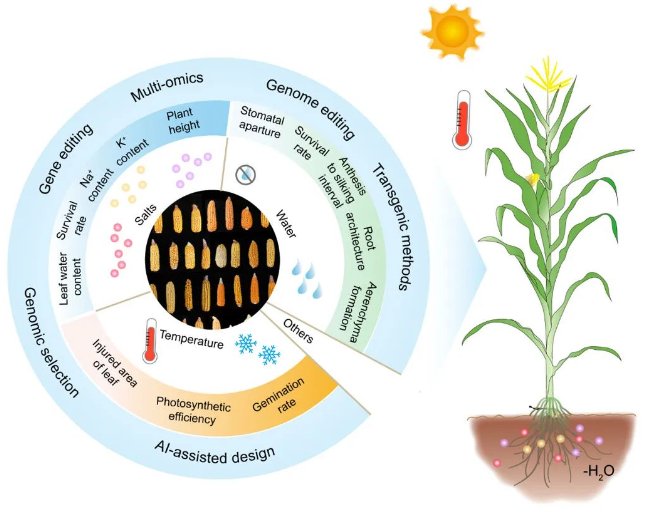With global warming and the increase of greenhouse gas emissions, the frequency and intensity of extreme weather conditions are increasing year by year, and the agricultural ecological environment is deteriorating. Among them, abiotic stresses such as drought, flood, extreme changes in environmental temperature and land salinization have become the key factors restricting crop yield and quality. In order to deal with this problem, studying the molecular mechanism of crop response to abiotic stress and analyzing the genetic basis of crop environmental adaptability will help to improve crop stress resistance and yield by using molecular breeding technology. As one of the world's three major food crops, maize is extremely vulnerable to the impact of climate change in agricultural production. It is reported that every 1°C increase in the global average temperature will reduce the average maize yield by 7.4%. Therefore, in the context of global climate change, accelerating the cultivation of new varieties of maize that are resistant to drought, saline-alkaline, and extreme temperature stress is a major strategic demand for ensuring food security and promoting green and sustainable agricultural development.
On July 18, 2023, Molecular Plant published online a review article entitled "Genetic and Molecular Exploration of Maize Environmental Stress Resilience: Towards Sustainable Agriculture" from the team of Shuhua Yang of China Agricultural University. This review summarizes the impact of environmental stress on maize production in detail, and then introduces the response mechanism of maize to abiotic stress from three aspects: water stress, extreme temperature and saline-alkaline.

This article focuses on the main research progress of maize response to various environmental stresses in recent years, including:
Finally, the article proposes several scientific issues that still need to be resolved in the study of crop tolerance to abiotic stress, including:
In response to these problems, the article further summarizes the strategies and feasibility of improving the stress resistance of maize, and puts forward the research direction of improving the stress resistance of maize to promote the sustainable development of agriculture in the future. It will provide a scientific basis for better understanding the ability of plants to cope with abiotic stress, further decipher the mystery of complex trait adaptation and "gene-environment" interaction mechanism, and lay the foundation for cutting-edge crop design and breeding innovation.
Reference:
Yang, Z., Cao, Y., Shi, Y. et al. Genetic and Molecular Exploration of Maize Environmental Stress Resilience: Towards Sustainable Agriculture. Mol Plant. 2023: S1674-2052(23)00207-1.